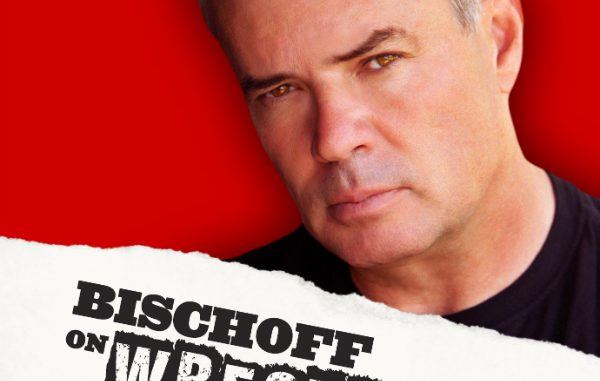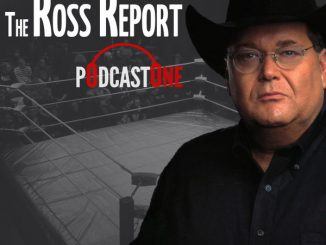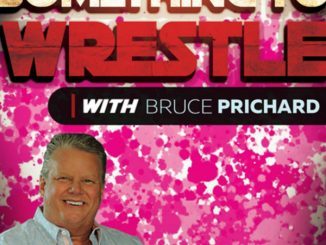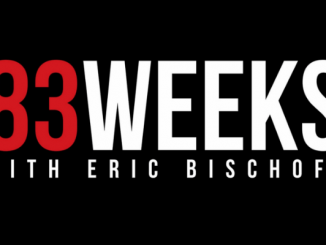
MLW Network’s Bischoff on Wrestling
Episode 38 Recap
By Craig Elbe
Hosted by Eric Bischoff and Nick Hausman
Duration: 58 minutes, 29 seconds
Timestamps:
1:54: Television industry talk.
5:29: The golden era of scriped TV.
14:10: Wrestling as the original reality show.
19:31: Bischoff recalls being asked to make WCW family-friendly.
22:48: How advertisers look at pro wrestling.
29:18: Political talk.
40:00: Okada vs. Shibata, and the dangers of certain moves.
44:38: Angle as new Raw GM.
48:29: JBL/Mauro Ranallo controversy.
Top Stories:
-The JBL/Mauro Ranallo situation is brought up, and while Bischoff thinks bullying is horrible, he also thinks people are overly-sensitive now.
-Bischoff has an upcoming project that he’s not allowed to talk about yet.
-Bischoff thinks wrestling organizations should put restraints on certain moves.
-Bischoff thinks that a more reality-based style of wrestling wouldn’t work well with the current WWE product.
Recap:
Eric Bischoff started the show at 47 seconds and introduced co-host Nick Hausman. Nick told us this episode will be a departure from the norm as Eric has a busy week. Eric is a proud part of a team to pitch a big concept type of (I’m assuming television) that’s been worked on the past four months. It’s in the final presentation stage and network executives are flying from New York to Los Angeles. The date of the meeting necessitates an earlier podcast recording; Nick and Eric apologize for not covering any breaking news that may occur on Tuesday due to this aberration. A confidentiality agreement prevents Eric from divulging more details on the project.
1:54
Nick said he’s always wanted to do a podcast where Eric talks about the process of selling a TV show to a network. Eric agreed and obliged as the busy week didn’t allow for a guest.
Eric started by saying selling TV shows to networks are different now as compared to five years ago, especially 15 years ago when he and Jason Hervey started their partnership. It used to start with an idea and a piece of paper while meeting with an executive. With a thumbs up, you’re in business. Nowadays, the production company conceives an idea, formats the idea, casts it and produces a casting reel/trailer and bears all costs, upwards of $25,000 dollars, that networks use after a thumbs up. The trailer is then used to pitch the concept to a network. The current nature of the business makes executives risk adverse due to the high cost of producing this type of content, which Eric estimates to be $5-7 million dollars.
5:29
Nick wondered what executives are looking for these days, citing a KISS themed football league reality show and Billy Corgan’s Resistance-Pro reality show as examples that didn’t make it past the pitch stage. Eric said the market is confused and the dynamics of entertainment are ever-changing. He said those and other reality shows didn’t get produced because the market was saturated with unscripted content from the writer’s strike going back around the early 90’s. (Eric’s timeline was off, the last two writer’s strikes were Nov 5, 2007- February 12, 2008 and March 7, 1988 and August 7, 1988). That saturation gave small cable companies, like AMC, the courage to go back to scripted programming, resulting in the multitude of options and quality of scripted content, such as Game of Thrones on HBO and Vikings on the History channel. Eric also referenced Breaking Bad and said we’re in the golden era of scripted content. Nick also credited The Walking Dead and Breaking Bad as part of reigniting that trend.
10:09
Nick asked if reality shows are more expensive to produce than scripted shows. Eric said reality shows are much cheaper as they don’t have writers to staff and pay. For example, a budget for a one-hour unscripted reality show on cable carries a $350-450,000 per hour license price fee. On the flip side, a scripted show would be $1.3-1.5 million dollars per hour to license.
12:22
Nick referred to Eric producing Hulk Hogan’s Championship Wrestling and said reality shows seem to be situationally scripted. Eric explained how scripted and unscripted are technically defined.
14:10
Nick said an Uber driver during WrestleMania weekend said wrestling was the original reality show by its nature. Eric agreed, and remembered his time in WWE to draw comparisons how reality TV works and how the two worlds differ. Eric said he pioneered a reality show-style in WCW for pro wrestling. He gave an example of when Kevin Nash lawn-darted Rey Mysterio into a production trailer outside the venue and the police presence that followed, as it had never been done before on live TV. Eric believes it became the hallmark for Monday Nitro.
19:31
Nick asked how that type of presentation would fare in today’s WWE that targets a younger demographic. Eric doesn’t think it would fare very well. He went into a career-defining moment from 1998 when WCW was doing very well and he was coerced in a meeting by many employees of the Turner ad sales division he didn’t know to produce WCW for a family audience. He almost quit as he knew it would fail, and was proven right when WCW was shut down. Eric isn’t keen on appealing to kids and adults in the same show as the gap is too wide, especially in today’s hyper-sensitive environment that’s also made advertisers scared.
22:48
Nick brought up WWE’s difficulty in attracting advertisers and asked Eric if he’d produce adult-themed content to spread out the demographics. Eric brought up how WWE only looks at their financials and would wonder what’s broken, and why fix what’s not broken due to their successful financials? Also, advertisers don’t want the guilty by association even if adult-friendly content would be tucked away on the WWE Network late at night, especially with WWE primarily targeting kids.
26:30
Nick wondered if internet content would ever get rated and put through a filter like TV content. Eric said it’s down the line but not anytime in the next couple years but could see it as the government likes to control everything. Nick brought up the net neutrality battle. Eric brought up president Trump signing an order to allow browser history to be sold. Nick disagreed on it being solely being on Trump.
29:18
Nick decided to get political and prodded Eric further about Trump and they have a spirited discussion about current events and politics.
40:00
Nick finally decided to get back to wrestling and brought up the Okada-Shibata match that saw stiff headbutts. Eric said headbutts and any other move done improperly in wrestling can result in injury, but headbutts, like piledrivers, are touchier as they deal with the head and brain. Eric feels wrestling organizations should be more judicious and put some restraint on certain moves, but talent should be smarter as well instead of trying to make a name for themselves with unsafe spots and moves, especially independent wrestlers. Eric said he headbutted his brother for fun may years ago and realized the slim margin of error for such moves. Ultimately, Eric sees this as the exception to the rule.
44:38
Nick brought up new Raw General Manager Kurt Angle wrestling again. Eric is very happy Angle is still capable of performing if he wants to if WWE clears him. Eric added Angle has the creative element that he, Mick Foley, and Teddy Long didn’t have by being able to physically back up their authority. Eric feels Angle was the right choice despite fans he encountered during WrestleMania thinking he was going to be the new Raw General Manager.
48:29
Nick saved the biggest story for last and asked Eric about the JBL bullying situation with Mauro Ranallo. Nick asked the question in such a way that raised Eric’s ire as Nick didn’t present any facts. Eric said he was an ideal candidate for bullying and hazing going back to his AWA beginnings, but especially in WWE given his prominent role in the Monday Night War, among other things he doesn’t indicate. He said he doesn’t care what other people say, he goes by what he sees. Nick said he was hazed on the independent scene, but Eric said he did not suffer the same fate in WWE nor see any such incidents. Eric said he endured plenty of bullying in his Detroit upbringing and thinks it’s horrible and wrong, but people have become over-sensitive as well.
56:05
Nick said next week’s episode will feature an extended mailbag as they couldn’t get to it on this podcast. Nick and Eric both wish Mick Foley a successful hip replacement surgery for April 19th. Eric is proud of the work Foley did to lose weight in preparation for the surgery. Eric comedically finished by telling Nick he pissed him off so bad he needs to locate his heart pressure medication.
Craig’s Conclusion: This episode suffers from a lack of a guest and the political talk, but Eric’s always present unique perspective shined a light on how appealing to a mass of demographics is very difficult and almost impossible no matter what the content is. Eric’s firsthand knowledge of how producing television has evolved was interesting. Eric’s thoughts on bullying are also worth checking out. I like how Eric calls Nick out with his wording while asking questions at times. He calls him out on every show. I don’t think they have the best chemistry but Eric is a professional and always brings things back around when they fall apart. Overall, this show is worth checking out, but no guest and the political talk affects my score negatively.
Score: 6 out of 10.
Thanks for reading my show review, please check out my weekly Talking Smack reviews as well!
To check on the entire show, click here.




Be the first to comment